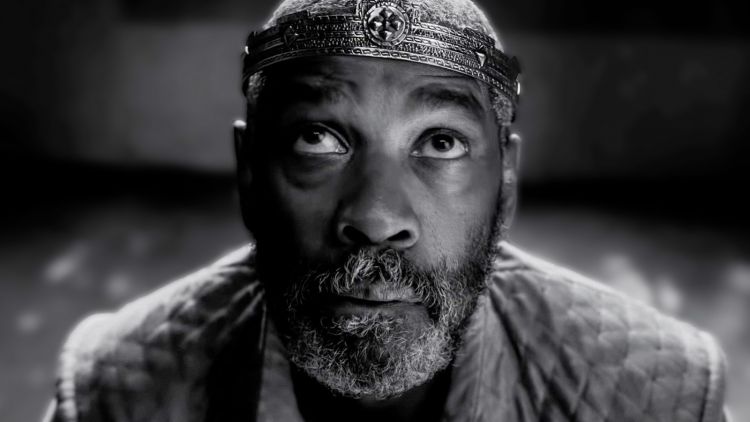With a partnership between powerful forces, what could go wrong? In Shakespeare’s Macbeth, the title character debates with Lady Macbeth whether or not to kill the King of Scotland. She says he should do it and achieve the throne destiny has set out for him. But he has never had any issues with King Duncan and would prefer to settle into his newfound role as Thane of Cawdor. It’s an argument of separate ambitions. As is the latest film from A24, The Tragedy of Macbeth, directed by Joel Coen in his first solo outing, featuring Denzel Washington as Macbeth himself.
A24 and Joel Coen have a lot in common on the surface. They both make films with distinct stylistic sensibilities that set out to be more than just your standard popcorn fare. They make you think, they make you rethink, and they make you a bit weirded out along the way. Surely they’re made for each other? Ay, there’s the rub, to quote another Shakespeare play. The fact that they both have powerfully distinct styles does not mean they have the same unique taste working in tandem.

A24 distributes many films, most with odd sensibilities, but the ones produced by the company tend towards horror and the uncanny. There are glimmers of that throughout The Tragedy of Macbeth, such as an eerie prophecy scene with children’s faces emerging from a pool to warn Macbeth of his doom. But Joel Coen, namely with his brother Ethan, tends to make films with eccentricity, dark humor, and wit. And there are glimmers of that as well here, such as a long tracking shot of the great character actor Stephen Root bumbling down a hallway as the infamous Porter of the Scottish Play.
This is to say that The Tragedy of Macbeth has memorable moments when it plays to one side of the coin or the other. The real tragedy is that much of the film exists in an in-between space, unsure of the tone it’s going for. The banquet scene with Banquo’s ghost, basically begging to be horror, becomes a muddled mess of Macbeth being badgered by a bird.
As such, the principal performers, including Denzel Washington and Frances McDormand as the Macbeths, give restrained performances that play it safe. They rarely emote and seem to aim for a thoughtful “hmm” reaction from the audience. They toe the line, and they do just fine.
So it’s up to the supporting actors to shock and thrill us in this tale of bloodthirsty ambition. Kathryn Hunter plays all three witches as a single entity having an identity crisis, evoking Gollum from The Lord of the Rings. But her jagged and beguiling contortions give Andy Serkis a run for his golden ring, so to speak. Alex Hassell, last seen in last year’s Cowboy Bebop simpering under a terrible wig, is allowed to come out from under it and give a more formidable performance as Ross. But he’s somewhat hamstrung by the truncated plot, which puts his character in conflicting situations at odds with the narrative. Harry Melling and Corey Hawkins give us much-needed emotional weight as Malcolm and Macduff, albeit briefly. It can’t be a coincidence that all of these supporting actors started primarily in theater, as they all seem perfectly at ease with Shakespeare.
While the film’s tone lives in a place of uncertainty, the design elements seem to know what they’re going for. The black and white filming works to facilitate a tale of plotting within shadow and carrying out dastardly deeds under cover of night. Production designer Stefan Dechant taps into German Expression for a medieval take on Metropolis with the austere castle and its grounds.
Just as everything unravels for Macbeth at the end, the film itself comes together. Birnam Wood comes to Dunsinane, there’s no way around it after all, and the march of the boughs is suitably surreal. This cataclysmic event forces fervid responses from the Macbeths, and Washington and McDormand deliver. The ensuing fight scenes are highly inventive in their minimalism, culminating in a visual metaphor that’s a real crowning achievement. It’s a shame the rest of the film isn’t as cohesive as this.
The Tragedy of Macbeth has a lot of talent behind it. There’s no doubt that either Joel Coen or A24 should have had the potential to make a uniquely wonderful Macbeth film. And of course, there could be several reasons for the lack of unity; I don’t actually know how much say A24 had in producing this. But the conflict of two distinct styles seems like the most reasonable explanation for the push and pull throughout the film, preventing it from wholly committing to one confident vision. So instead we have to settle for a fine enough work, but one as conflicted as Macbeth himself.
The Tragedy of Macbeth
Summary
On paper, a Joel Coen adaptation of Macbeth produced by A24 and starring Denzel Washington should work well. But despite all the Oscar buzz, the film struggles alongside its protagonist in deciding what it wants to become. But if the primary artists can’t seize the occasion, the supporting actors and designers on this film just manage to save it.
-
The Tragedy of Macbeth




